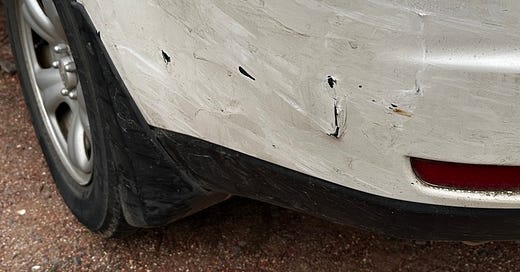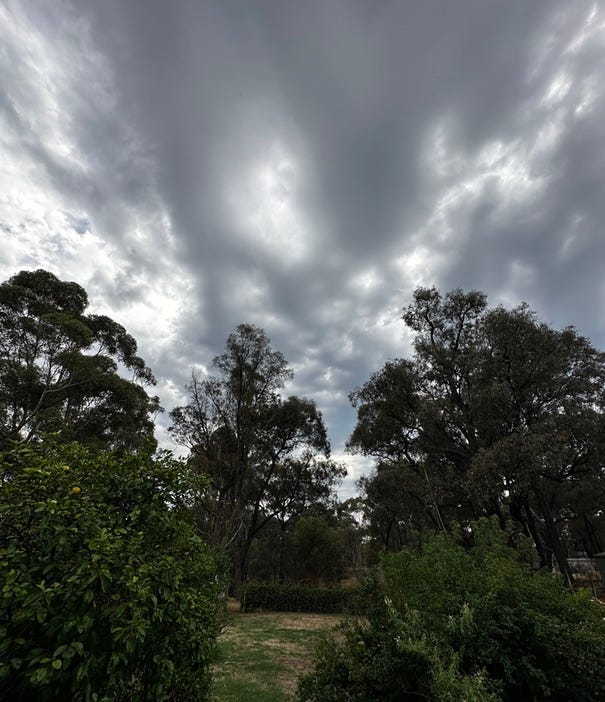Collision
In this episode we explore the kind of consequences that may arise when we miss things that matter…
Yeah, I made a mistake.
It was there the whole time, moving fast towards me. But I saw it only at the last moment, way too late to respond.
The signs were there, but I missed it.
Which meant it didn’t miss me.
Collision, against another car…
Sure, it’s not hard to work out how it happened. Despite it being near midday in near-midsummer, everywhere was dark, murky, damp. A heavy rainstorm had just been through, so the car windows were rain-splattered, making it hard to pick out the detail that I needed: hard to pick out the signal from the noise. It’s a broad two-by-two-lane mid-town road that I needed to cross. Down the hill, on the driver’s side, the traffic was stopped at the traffic-light, so all safe there. On the other side, there’s only one car there, white and high-sided like mine, lights on like every other car I can see, but it’s slowing down and signalling to go into the side-turning just before me, so all safe there too. Off I go. I’m almost all the way across when I realise, just too late, that hidden diagonally behind that white car was another one, now too close to avoid. And I panic, and hit the brakes instead of the accelerator, making things worse.
Collision.
No-one hurt, fortunately: some luck there, at least, amidst all the other bad luck.
Plenty of hurt in other senses, though. It’s going to hurt my wallet, for sure, especially on my near non-existent income. Even more, it’s hurt my pride, my certainty, my confidence as a driver: I’ve made mistakes, of course, like everyone else, but in at least fifty years on the road now this was the first that’s ever involved anyone else. That crushing sense of failure, guilt, shame, at having messed up someone else’s life, rather than just my own: that’s perhaps the hardest part right now.
All my own fault.
To be fair, visibility was bad, anyway, so there was always going to be some element of risk. And unlike any other car there, that one had no lights on, and was all grey on a grey road with a grey background under a dull grey sky - almost perfect camouflage, under the circumstances.
But those are just excuses - and excuses don’t change anything. Sure, I can learn from them, as best I can - but they don’t turn back time, make the mistake not happen. That’s just fantasy. All that’s real are the consequences, and what we do next.
Yet it isn’t just me, is it? And there’s a lot more of it than just a few dents and scrapes.
There are so many other things, so much like this, that are much, much larger in scope and scale, yet have almost exactly the same underlying drivers and concerns. Maybe we need to look at those too, in much the same way…
Yeah, we’ve made a mistake.
It’s been there the whole time, moving fast towards us. But we’ve seen it only at the last moment, way too late to respond.
The signs were there, but we missed it.
Which means it won’t miss us.
Collision, against Reality Department…
Sure, it’s not hard to work out how it happened. Every day there’s weather - lots of it, sometimes. Yet hard to see the signal we need behind all of that day-to-day noise. True, there are visible dangers from a storm or cyclone, their clouds white and high-sided from above, but we know how to deal with those. No worries: just get on with the day. Yet hidden diagonally behind that all detail there’s something else: large-scale long-term climate-change, too close now to avoid. And we panic, and hit the metaphoric brakes, clinging to the present, instead of accelerating onward towards much-needed change.
Collision.
Not many hurt yet, so far, fortunately: some luck there, at least.
Yet we know now, for certain, that the collisions are going to keep on coming, harder and harder, and there’s plenty more hurt coming our way. In this money-obsessed world, it’s going to hurt everyone’s wallet, and all too many other costs too, in so many different forms. Even more, it’ll hurt our pride, our confidence, our over-certainty in our knowledge about how the world really works. We’ve had at least fifty years’ warning that this would happen if we didn’t change our ways, and there’s no doubt now that this mistake that will affect everyone’s lives from here onward, maybe forever. For me at least, that crushing sense of failure, guilt, shame, at having messed up others’ lives, rather than just my own: that’s perhaps the hardest part right now.
All our own fault.
To be fair, visibility of slow, small, subtle, cumulative, long-term change would always be hard, so there was always going to be some element of risk there. And unlike the daily weather that we could see so easily, and all those ‘economic imperatives’ that told us that ‘making money’ in the short-term was far more important than the environment we live in, this one was harder to see, hidden in the background, a metaphoric grey on a grey road with a grey background under a dull grey sky - almost perfect camouflage, under the circumstances.
But those are just excuses - and excuses don’t change anything. Sure, we can learn from them, as best we can - but they don’t turn back time, make the mistake not happen. That’s just fantasy. All that’s real are the consequences, and what we do next.
There are two key elements to these types of collision.
First, they’ll often occur within a chaotic-system - one in which there may be many often-unpredictable factors that can also interact with and exacerbate each other in often-unpredictable ways. Such chaotic-systems are also often ‘pseudo-stable’: they can seem entirely stable and certain for long periods, until suddenly they aren’t. That’s when, and why, the collision will occur.
The other element is they each represent what’s known as a kurtosis risk - a risk that may at first can seem vanishingly-small, but quietly increases with each iteration of the risk-event, and in which the gains from ignoring that risk are vastly outweighed by the losses when the risk does finally eventuate. That’s when, and why, and how, a collision can get to be decidedly un-fun…
So what can we do about that?
The first task is to get a better understanding of the respective chaotic-system, and particularly the chaotic-attractors that create its illusion of stability. With that in hand, we need to go looking for any factors that we actually can control or influence, versus the ones that we actually can’t.
Next, we need to be honest about the kurtosis-risks here - perhaps particularly about those that we’d like to pretend aren’t there but actually are. And we then need to understand how each of the factors in each of those risks can amplify themselves over time. We need to be especially diligent to find any factors that may expand exponentially, because those are the ones that can ultimately cause the most devastating effects.
We then bring all of this together, to find out what our options really are. For some things, it’s already too late now: all we can do there is find ways to deal with the consequences of that bald fact. But for those things that we can still change, we need to sort out our priorities: which factors would give us best leverage for best outcomes, and so on. Any exponential-type factors are probably the ones we need to aim for first, as even small improvements can reduce by a lot the damage caused in any collision.
To be honest, it’s not looking good right now at the big-picture scale - and there’s still way too much pushback against essential big-changes such as the scrapping of the possession-economy, without which change we have no chance of survival in any viable form. But do what we can to improve our chances, anyway, while we still have the chance to do so at all.




